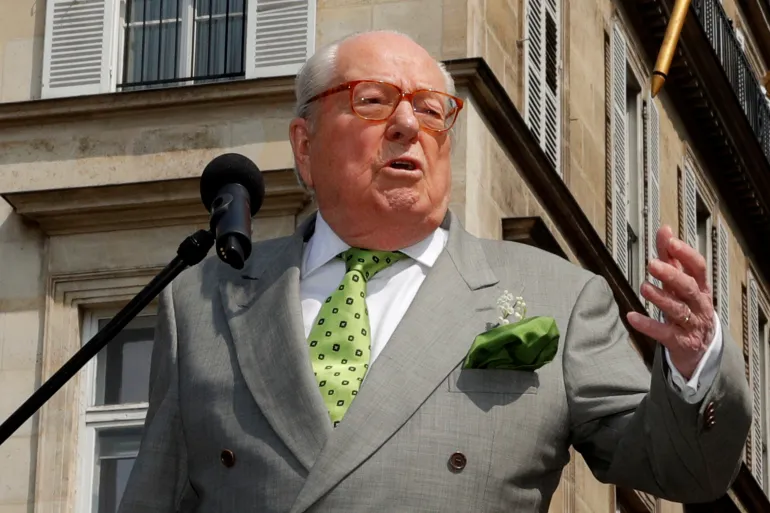Jean-Marie Le Pen, a towering and controversial figure in French politics, passed away on January 7, 2025, at the age of 96. As the founder of the far-right National Front (now National Rally), his career spanned decades and left an indelible mark on France’s political landscape. Loved by his supporters and vilified by his detractors, Le Pen’s life and legacy continue to spark debate long after his death.
Jean-Marie Le Pen’s early life: Foundations of a Firebrand
Born on June 20, 1928, in La Trinité-sur-Mer, Brittany, Jean-Marie Le Pen experienced tragedy early in life. Orphaned as a teenager, he developed a fierce independence and nationalist fervour that would shape his future.
Le Pen’s military service during the First Indochina War and the Algerian War further solidified his worldview. His experiences in these conflicts forged a staunch belief in preserving French identity and sovereignty, ideals that became cornerstones of his political ideology.
Founding the National Front: A New Political Force
In 1972, Jean-Marie Le Pen co-founded the National Front, a party that would come to define his political career. The National Front’s platform centred on issues like immigration control, French nationalism, and opposition to the European Union. Le Pen’s rhetoric appealed to a growing segment of the population disillusioned with traditional political parties and concerned about globalization and cultural change.
Under his leadership, the National Front transformed from a fringe movement into a significant political force. By the 1980s, the party began gaining traction in local and national elections, challenging France’s political establishment.
A Career Defined by Controversy
Le Pen’s career was marked by provocative statements and polarizing policies. Among his most infamous remarks was his characterization of the Holocaust as a “detail of history,” which sparked outrage and led to multiple legal challenges. He was convicted several times for hate speech and defamation, cementing his reputation as a divisive figure.
Critics accused Le Pen of xenophobia and anti-Semitism, while supporters viewed him as a champion of free speech and a defender of French identity. His unapologetic style and willingness to court controversy ensured his prominence in political discourse but also alienated many voters.
The 2002 Presidential Shock
Le Pen’s most significant political moment came in 2002 when he advanced to the second round of the French presidential election. This unexpected victory stunned the nation and highlighted the growing appeal of far-right politics. Le Pen ultimately lost to Jacques Chirac, who won by a landslide as voters from across the political spectrum united against the National Front.
The 2002 election marked a turning point in French politics, forcing mainstream parties to confront issues like immigration and national identity that Le Pen had long championed. It also underscored the National Front’s emergence as a serious contender in French elections.
Leadership Transition and Family Rift
In 2011, Jean-Marie Le Pen stepped down as leader of the National Front, passing the torch to his daughter, Marine Le Pen. Under her leadership, the party sought to soften its image and broaden its appeal, rebranding as the National Rally.
The transition, however, was not without conflict. Jean-Marie’s hard-line views often clashed with Marine’s efforts to modernize the party. This tension culminated in 2015 when he was expelled from the party he had founded. The rift between father and daughter highlighted the challenges of balancing ideological purity with political pragmatism.
Legacy: A Lasting Impact on French Politics
Jean-Marie Le Pen’s impact on French politics is undeniable. He brought issues like immigration, national identity, and globalization to the forefront of public debate, forcing mainstream parties to address them. While his methods and rhetoric were often controversial, his influence shaped the trajectory of the far-right in France and inspired similar movements across Europe.
Supporters remember Le Pen as a patriot who fought tirelessly for France’s sovereignty and cultural heritage. Critics, however, view his legacy as one of division and intolerance. Regardless of perspective, Jean-Marie Le Pen’s life and career underscore the enduring power of populist politics and the challenges of addressing complex social issues in an increasingly globalized world.
SEO-Friendly Highlights
- Key Themes: Jean-Marie Le Pen, National Front, French far-right, immigration, populist politics, French nationalism.
- Target Keywords: Jean-Marie Le Pen obituary, National Front founder, French politics, far-right leader, 2002 presidential election, Marine Le Pen.
- Meta Description: “Jean-Marie Le Pen, founder of France’s far-right National Front, dies at 96. A polarizing figure, his legacy reshaped French politics and sparked global debate.”
Final Thoughts
Jean-Marie Le Pen’s death marks the end of an era in French politics. His life was a testament to the power of conviction and the enduring appeal of nationalist ideals. As France and the world reflect on his legacy, one thing is certain: Jean-Marie Le Pen’s impact will be debated for generations to come.

